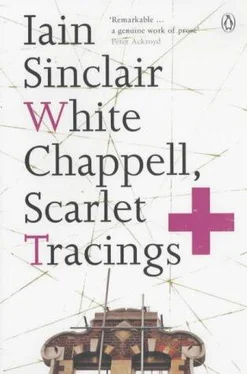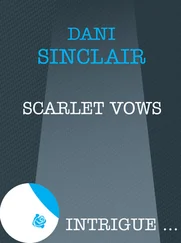She starts with her back to them, herself in the long mirror, a film, the shadow of herself; unconnected, slowly stripping away everything, revealing nothing, Inanna through the seven gates of Ereshkigal’s Temple. They fasten upon her their eyes of death, she hangs against the stalks of their desire. The ritual sours and dries.
She walks, naked, among them, high heel’d, dirty scarlet shoes, spangled with dull sequin stars, leper shoes, collects her tithe, smoking, clink of coins in a pewter pot.
They are on the street and the heat of the old story begins to work with them. The Nazrul again, gobbling spiced meats, saffron rice, mummia. Coupled men lazy at tables, sweet sweet cakes, condensed milk-sick pastries. A single white girl, painted like a fairground horse, nostrils flaring, outlined in scarlet varnish, dead confectionery eyes, sitting on the table edge. The men fondle and ignore her. She creaks back out to the street, leather skirt, gladiator.
A voice from the table behind them, ‘Well, you made a killing,’ from an empty booth; their nerves heightened, overtuned, dictating messages. ‘You made a killing.’
Rain spores die on the paving stones, remote energies drawn down into the entropy of the spiral; vegetable forces, pallid ferns pushing the cobbled bricks apart.
We share a bottle of menstrual wine, vagrants; we spit into wild gardens. We lick cigar stumps. We kick walls.
The dwellings on the south side of the Jewish Burial Ground have been evacuated by keyholders, occupied by derelicts and vermin; doomed, the whole zone is doomed; the stones will be razed, brick from brick, their histories flattened, buried in dust mounds. The geology of time is available to us now, at this moment, this afternoon, and will be gone, will be forever unreachable. Unredeemed.
Steps lead up to an openair chapel; high crenellated wall, arched, roofed, summer house, place of worship. Like a dockside; three triangle peaks painted with the eye of Horus. A half savage Baptist garden; tenement ravines all around, keeping out the light; shadow garden, balconies, stairwells, dark entrances. There are twin tablets set into the wall, tract commandments, for eyes lifting from the drone of psalms.
On the right: ‘Labour/is life/blessed is he/who has found/his work .’ The work that was short was life. Soon finished. Crushed.
On the left: ‘Whatsoever/thy hand/findeth to do/do it with/thy might.’
Sixteen windows to the block, and four more set into the roof: blind eyes. Condemned time. This pre-rubble set, held upright on beams. The enduring strength of slums. Bearded charities built to last for a thousand years.
Five arches to the altar shed, the umbral body of the chapel; unattended god trap.
We made shift to the Brewery, let the trace in the ground lead us, the hare foot. A tide pulls us around islands of dereliction, gypsy spaces, remnants of civic concern, carefully plaqued, railway arches worked with wrecked motors, scrap melt. Through Durward to Vallance, cut down Buxton Street towards the back gate of the Brewery, to punch out.
A group of mid-Victorian cottages, marked for demolition, have been sealed with a corrugated iron fence. There is a poster, ‘SS’, Nazi pastiche, radical, protesting Social Insecurity. As we read, a thin vermouth’d voice accosts us; glass tearing silk.
A woman with sauce-bottle hair, dyed rope, interprets for a small, wet skulled, shaking, tremulous, doll-like figure in pyjama trousers and carpet slippers. His armchair has been dragged out onto the pavement, out from where? Perhaps he lives in it. A few streaks of hair have been painted on his scalp, brown-red stain running down his pinched cheeks, like a hammer wound.
The woman has been told to ask if we are Germans.
Joblard, humoured with drink and exercise, raps out a few phrases of cod Mabuse. The little man contorts with real horror, kicking back his feet, dragging the great chair with him, covering his face with a thin arm.
The woman explains that he was in the camps; his name is Hymie, a tailor. They’re going to pull down his house.
My wife and daughter have gone to stay for a few days with her mother, convalescing, within sight of the North Sea. Joblard returns with me, therefore, to run the afternoon into the night.
We tip out the fridge and eat it, shelf by shelf: olives, salad, rice pudding, bacon, cheese. Methodically swilling it down with a mix of Russian Stout and dry blackthorn cider. There remains only a chocolate cake of doubtful provenance, gifted by Divine Lit neighbours, by way of an Alice B. Toklas cookbook; and probably enlivened with middle-eastern additives.
Gorge, swill and choke; mouths black as mud gobblers. A good exhaustion and a buff envelope of bank notes in the pocket.
The cake has no immediate effect, we cram in a few more slices. And the television starts to acquire a previously unnoticed wit. Everything is ironic. Every remark is hilarious, but understated: nobody else could see it. We are lying on the floor, taking everything that is thrown at us, uncritical, amused. It’s all the same, isn’t it? Watch anything and find a value.
The programme we have been waiting for slides up on us, out of nowhere. The final shot in a television investigation of the Whitechapel Murders, The Ripper File .
In our deranged state there is no interest in following detail or making logical connections; we know it all. We shut our eyes: Masons, Clarence, Druitt, conspiracy, asylum. All that matters is the simple basic metaphor: three men, Sickert the painter, Netley the coachman, Gull the doctor. If the equation is neatly made, then it is true. The hair starts to rise on the scalp, there is some sort of recognition, names known, places known. It is confirmed merely.
We force ourselves to concentrate on the remote and ridiculous voices.
‘Do you have a picture of him?’
‘Who?’
‘Sir William Gull.’
‘He looks a lot more important than the other two suspects.’
‘He was. A self-made man. Cured the Prince of Wales of typhoid and never looked back. He left £340,000 — a big fortune in those days.’
‘Not bad now. Can you really see a man like that going down to Whitechapel and playing his part in the murder of five prostitutes?’
I’m crawling towards the set, I’m forcing my face to look at it. Behind the wavering lines is a face that is firmer and better known to me than my own. It is the face of Joblard, the orphan.
Sir William Gull has stolen the orphan’s face. His arrogance and self-containment chill me.
Does Joblard look at himself? Confront the self that is now accusing him, that knows him, that is pushing him to make himself available for the enactment of an ancient crime? The self that he has been unconsciously playing.
He does not: he’s lying, face in the bathtub, groaning, watching the swill of regurgitated chocolate, curry, stout, feathering , clockwise, around the eye of the plughole.
The exchange of wills is postponed.
It was the first time I had seen anybody cook with yoghurt. Dark varnish, tall ceiling, window smeared with grease from steaming meats, oak and oilskin, the hull of the room bellying out over a small garden sprinkled with a scattered eruption of sickly plants: sleeves rolled neatly to the elbow, his large hands moved with forensic exactitude, scapula under the sizzling ‘black ornaments’, just before they burnt, shook the rice in a separate pan, merely dipping the fingers of the green vegetables in boiling water. Old India hand.
The day was warm, expansive, blankets of yellow hammerhead flowers breaking out in a screech among the condemned gardens, the fenced lots. The long inertia was torn, the room-locked stiff-spined creaking winter people were irritated, ready to be moving, to get early among the streets; to search for it, find it, take it on.
Читать дальше












